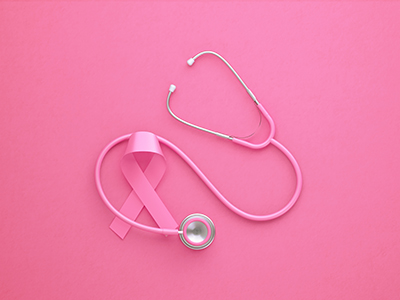 National Women’s Health Month is held every year during the month of May. This year, the Division of Breast and Endocrine Surgery wants to encourage women to learn more about the signs, symptoms, and screening options for breast cancer.
National Women’s Health Month is held every year during the month of May. This year, the Division of Breast and Endocrine Surgery wants to encourage women to learn more about the signs, symptoms, and screening options for breast cancer.
Signs and symptoms
Whether you are new to the topic of breast cancer or a seasoned vet, knowing the signs and symptoms of breast cancer are incredibly important. Browse the list below and reach out to your doctor anytime if you have questions or concerns.
“Being proactive about your health cannot be overstated.” said Assistant Professor Rachael Lancaster, M.D., FACS. “I would rather women more readily bring any concerns they have to their providers than ignore a problem.”
Possible symptoms of breast cancer include:
- New lump or mass in the breast
- Swelling of all or part of a breast (even if no distinct lump is felt)
- Skin irritation or dimpling of the skin
- Breast or nipple pain
- New nipple retraction (turning inward)
- Redness, scaliness, or thickening of the nipple or breast skin
- Nipple discharge (other than breast milk)
Self-Exams: Why & How?
In addition to regular mammograms, Chief of the Section of Breast Surgery, Catherine Parker, M.D., encourages women to self-examine their breasts for any potential signs of breast cancer.
“Mammograms do not detect every breast cancer. Women at every age should be familiar with how their breasts normally look and feel, and alert their providers should there be a new change in their breasts,” says Parker.
It is important for patients to know the proper technique, what to look for, and what is their normal. Being self-breast aware should start in late teens and early 20s and should continue throughout life. Knowing what is normal for your body is important when trying to determine if there is reason for concern. For example, has one breast always been smaller or has one nipple always turned inward?
Self-exam technique is also important. Breastcancer.org offers a great step-by-step breast self-exam process. So, grab a mirror at least once a month and get self-aware with self-exams!
Mammograms and Breast Cancer Screening
A critical part of your breast health regimen is getting regular mammograms. The Division of Breast and Endocrine Surgery recommends that women who are at average risk for breast cancer start getting mammograms yearly at age 40.
Some women may be at elevated risk for breast cancer due to family history or other personal risk factors. These women at increased risk of breast cancer may need to start screening early. Openly discuss your questions regarding when to start screening for breast cancer with your doctor and develop a plan for screening. For more resources on early detection and screening for breast cancer, visit this O’Neal Comprehensive Cancer Center at UAB webpage.
Join the WISDOM Study
If you want to learn more about your personal risk of breast cancer and want to evaluate screening based on these risk factors, consider joining the WISDOM study. The WISDOM study aims to bring together 100,000 diverse women from across the US ages 40-74 to evaluate breast cancer screening.
This national study is testing a personalized, risk-based approach to breast cancer screening and risk assessment. Being part of the WISDOM study provides women the opportunity to learn more about their personal risk factors for breast cancer including gene testing and offers methods of breast cancer risk reduction. Furthermore, if a woman wants to continue getting her mammograms every year just as she has always done, she can still participate in this study.
Assistant Professor Rachael Lancaster, M.D., encourages all women to consider the study. “This study allows all women to participate and we hope it will identify ways to improve upon our already strong screening recommendations,” said Lancaster. “We want to reduce women’s risk of breast cancer and we want to catch any cancers that develop at early stages.”
To learn more about the WISDOM study, visit thewisdomstudy.org.